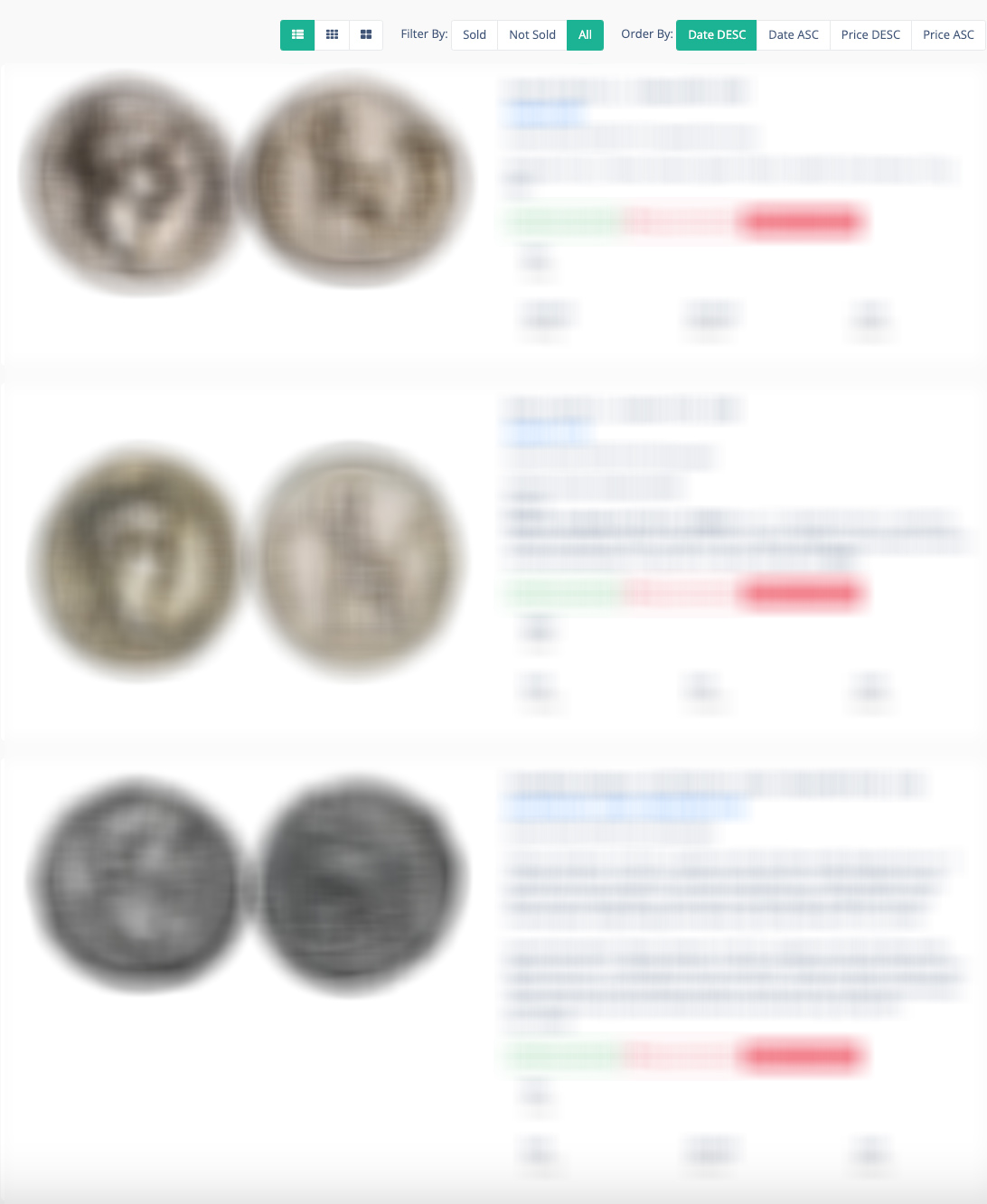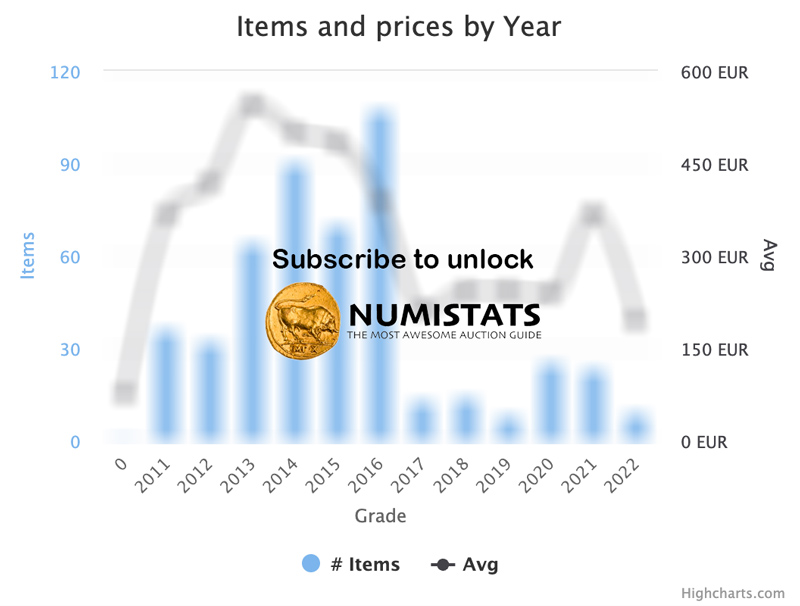Numismatik Naumann - Auktion 148 . 919

Roman Imperial Coins
Categoria
RIC (Gratian)
49C
VALENTINIAN II (375-392). GOLD Solidus. Treveri.
Obv: D N VALENTINIANVS IVN P F AVG.
Pearl-diademed, draped and cuirassed bust right.
Rev: VICTORIA AVGG / TROBT.
Two emperors seated facing on throne, hoding globe between them; above, winged Victory facing, with wings spread; below, palm frond between.
RIC 49c.2; Depeyrot 47/3.
Flavius Valentinianus, of Augusta Treverorum (Treveri), son of Justina, ascended the throne when he was only four years old. He was elected augustus in 375 by the soldiers, because they refused to let the sole legions of Germania, who had nominated Valentinian's elder half-brother Gratian, choose the emperor. However young, Valentinian faced complicated situations with his mother and Gratian, such as the usurpation of Magnus Maximus in Britain, which was remedied by Theodosius I, who managed to prevent Valentinian from being attacked by the insurgent's legions. More complicated was the matter of the removal of the Altar of Victory from the Senate of Rome, which represented the city's glorious pagan tradition. Its removal was supported by Gratian, on the advice of charismatic figures such as Mediolanum bishop Ambrose, which led him to confront a group headed by senator Quintus Aurelius Simmachus. As much as Justina and her son were of the Arian faith and close to Simmachus, the altar was nevertheless removed to the great scandal of the court of Rome. When his mother and brother faced such situations, because of his young age Valentinian often remained in the background; moreover, he fell under the spell of a dangerous character: the Frank leader and able warrior Arbogastes, his magister equitum. Soon, however, their relationship became conflictual, partly because of the Altar of Victory, which Arbogaste wanted to see restored. Valentinian was found hanged from a tree in 392 at Vienne in Gaul. Sources disagree on the cause of death, some mentioning suicide, others leaning toward murder by Arbogaste. The emperor was probably the victim of a palace conspiracy, as Arbogaste had led to the elevation of Flavius Eugenius to augustus. The damnatio memoriae documented by some eroded inscriptions may support this hypothesis. His funeral was held in Mediolanum, at the behest of Theodosius I, by Bishop Ambrose, who also wrote a consolatory piece on the young emperor's death for the occasion.
Condition: Extremely fine.
Weight: 4.44 g.
Diameter: 20 mm. Descripción
Obv: D N VALENTINIANVS IVN P F AVG.
Pearl-diademed, draped and cuirassed bust right.
Rev: VICTORIA AVGG / TROBT.
Two emperors seated facing on throne, hoding globe between them; above, winged Victory facing, with wings spread; below, palm frond between.
RIC 49c.2; Depeyrot 47/3.
Flavius Valentinianus, of Augusta Treverorum (Treveri), son of Justina, ascended the throne when he was only four years old. He was elected augustus in 375 by the soldiers, because they refused to let the sole legions of Germania, who had nominated Valentinian's elder half-brother Gratian, choose the emperor. However young, Valentinian faced complicated situations with his mother and Gratian, such as the usurpation of Magnus Maximus in Britain, which was remedied by Theodosius I, who managed to prevent Valentinian from being attacked by the insurgent's legions. More complicated was the matter of the removal of the Altar of Victory from the Senate of Rome, which represented the city's glorious pagan tradition. Its removal was supported by Gratian, on the advice of charismatic figures such as Mediolanum bishop Ambrose, which led him to confront a group headed by senator Quintus Aurelius Simmachus. As much as Justina and her son were of the Arian faith and close to Simmachus, the altar was nevertheless removed to the great scandal of the court of Rome. When his mother and brother faced such situations, because of his young age Valentinian often remained in the background; moreover, he fell under the spell of a dangerous character: the Frank leader and able warrior Arbogastes, his magister equitum. Soon, however, their relationship became conflictual, partly because of the Altar of Victory, which Arbogaste wanted to see restored. Valentinian was found hanged from a tree in 392 at Vienne in Gaul. Sources disagree on the cause of death, some mentioning suicide, others leaning toward murder by Arbogaste. The emperor was probably the victim of a palace conspiracy, as Arbogaste had led to the elevation of Flavius Eugenius to augustus. The damnatio memoriae documented by some eroded inscriptions may support this hypothesis. His funeral was held in Mediolanum, at the behest of Theodosius I, by Bishop Ambrose, who also wrote a consolatory piece on the young emperor's death for the occasion.
Condition: Extremely fine.
Weight: 4.44 g.
Diameter: 20 mm. Descripción
extremely fine
Conservación
600 EUR
Salida
750 EUR
Estimado
EUR
Realizado
AI Recommendation
Para estimar un precio máximo de compra para la moneda en cuestión, consideraremos varios factores:
1. Precio de salida: 600 euros. Este es el precio inicial que se establece para la subasta.
2. Conservación: La moneda tiene una conservación de 90 (extremely fine), lo que indica que está en muy buen estado. Esto generalmente aumenta su valor.
3. Datos históricos: La moneda se ha subastado una vez en el pasado, pero no se ha vendido. Esto puede indicar que el interés en la moneda es limitado o que el precio de salida fue demasiado alto en la subasta anterior.
4. Precio medio de salida: 500.09 euros. Este es un dato importante, ya que sugiere que el precio de salida actual (600 euros) es superior al promedio histórico.
5. Veces que se subastará en los próximos días: 1. Esto significa que hay una oportunidad inmediata para la compra.
Dado que el precio de salida es más alto que el precio medio de salida y considerando que la moneda no se ha vendido en la subasta anterior, es posible que el interés no sea tan alto. Sin embargo, la buena conservación puede atraer a algunos coleccionistas.
Teniendo en cuenta todos estos factores, un precio estimado máximo de compra podría situarse entre el precio de salida y el precio medio de salida. Podríamos considerar un precio máximo de compra de aproximadamente 550 euros, que es un poco más bajo que el precio de salida, pero aún refleja el buen estado de la moneda.
1. Precio de salida: 600 euros. Este es el precio inicial que se establece para la subasta.
2. Conservación: La moneda tiene una conservación de 90 (extremely fine), lo que indica que está en muy buen estado. Esto generalmente aumenta su valor.
3. Datos históricos: La moneda se ha subastado una vez en el pasado, pero no se ha vendido. Esto puede indicar que el interés en la moneda es limitado o que el precio de salida fue demasiado alto en la subasta anterior.
4. Precio medio de salida: 500.09 euros. Este es un dato importante, ya que sugiere que el precio de salida actual (600 euros) es superior al promedio histórico.
5. Veces que se subastará en los próximos días: 1. Esto significa que hay una oportunidad inmediata para la compra.
Dado que el precio de salida es más alto que el precio medio de salida y considerando que la moneda no se ha vendido en la subasta anterior, es posible que el interés no sea tan alto. Sin embargo, la buena conservación puede atraer a algunos coleccionistas.
Teniendo en cuenta todos estos factores, un precio estimado máximo de compra podría situarse entre el precio de salida y el precio medio de salida. Podríamos considerar un precio máximo de compra de aproximadamente 550 euros, que es un poco más bajo que el precio de salida, pero aún refleja el buen estado de la moneda.
Vendido (0%)
No vendido (100%)





